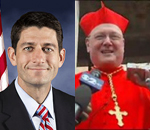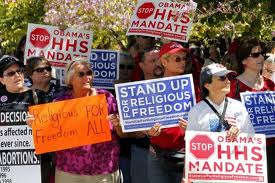
It’s no secret that many bishops, including Cardinal Timothy Dolan of New York, are incensed with the Obama administration over contraception coverage requirements under the Affordable Care Act. Bishops have missed few opportunities to blast the presidentas hostile to religious liberty – a meme that Mitt Romney has eagerly picked up on in a campaign ad that depicts President Obama as waging a “war on religion.”
But the selection of Rep. Paul Ryan – an intellectual darling of the conservative movement who embraces Catholic teaching to defend his policies – has complicated the Catholic narrative during these final months heading into the election….

In the cover story of the August 6 edition of Time magazine, Joe Klein offers a rather grim account of the U.S. national conversation about guns in the wake of recent mass shootings. He writes about the ways in which the political climate, increasingly and rather bizarrely governed by the gun lobby, has made it impossible to have any serious political dialogue about the regulation of guns and ammunition. The article is provocatively entitled, “How Guns Won.” It is clear to me from reading the piece, however, that Mr. Klein wants to stay far from actually attributing victory to guns themselves. Rather, he wants to maintain the more commonsense view that it is those political actors that value gun-owning, certainly backed by the gun industry but also fiercely devoted to libertarian ideals, that have won decisive victories. However, I think we could take Mr. Klein’s title quite literally and say that guns themselves have essentially won what Bruno Latour might call a “trial of strength” in which they had been engaged with their critics….
In the aftermath of the Episcopal Church (USetc)’s General Convention, there’s been a flurry of breast-beating, moaning, finger-pointing, boasting, and other edifying demonstrations of ecclesiastical vitality (or not) in the various social media sites….
I’m a liberal, but I don’t want to be in a liberal church, because liberals unchecked are prone to do stupid things. And I think the same holds true for conservatives that want to make a ghetto for themselves on the right. These would be terrible developments for the church to split ourselves the way some on the right are advocating. In the kingdom of God, the church will have every ideological stripe.
The conservatives did what they had to do to win. They ran out the clock, wore people down, kept their troops in line, and ultimately prevailed thereby. Not letting the Assembly debate the issue of the Authoritative Interpretation, however, is going to be a costly mistake. My sense is that commissioners thought that this is something like the ordination question that we debated for so many years. People could get only so far in one Assembly on that issue, but would reach an impasse, whereupon folks would realize that it would just have to wait until the next Assembly to get to the next step. But marriage is very different from ordination. Councils of the church perform ordinations, so you have to get a group of people to agree to move forward. Marriages, however, are performed by individual pastors. And the emotion surrounding a marriage is way higher than any ordination.
When the Committee on Middle East Peace finally made its motion to divest–you guessed it– a substitute motion was made, not divest but rather to invest in the Occupied West Bank. This was a masterstroke of polity, but a completely ridiculous proposal of policy. Presbyterians suffer from congenital niceness, which is the main reason that it had taken us eight years even to get to the point where we could make the least confrontational action possible on the issue, selling our own stocks and bonds.
This was my first experience of how the conservatives would use parliamentary maneuvers to block what was shaping up to be a progressive assembly by proposing study after study, utilizing minority reports and substitute motions designed to keep the Assembly from making decisions or even hearing about some important issues for as long as possible, if at all.
Atheism is all the rage today. That is, a kind of rejection- whether a traditional form of atheism, or the Christian rejection of certainty- is catching on. Some in the emerging church circles call for an “epistemological humility,” a theological hedging that tempers a rigid Evangelical orthodoxy. Still others, such as Peter Rollins, turn to more philosophical traditions, such as that of Hegel, which value a “negation.”
Rollins summarizes this kind of Christian A/theism in a number of places, and thus offers a helpful summary in his chapters in Church in the Present Tense. Providing a kind of archeology of modern categories through the thought of philosophers like Kant and Hegel, he states that there is a moment of negation when the ideas and values are denied. In turn then, he says, there comes a moment of double negation- that place when even the denial is denied.
Unfortunately, Peter and his philosophical partner Hegel are about 1700 years late. The desert monks spoke of a similar path, just without the seeming circularity of modern critiques of metaphysics.
In our present context, it is easy to see why, even in the Church, such a manner of life, in which possessions were held in common, as is described in Acts 4 would be greeted with as much scorn and ridicule as if one had suggested the normalization of pedophilia.

